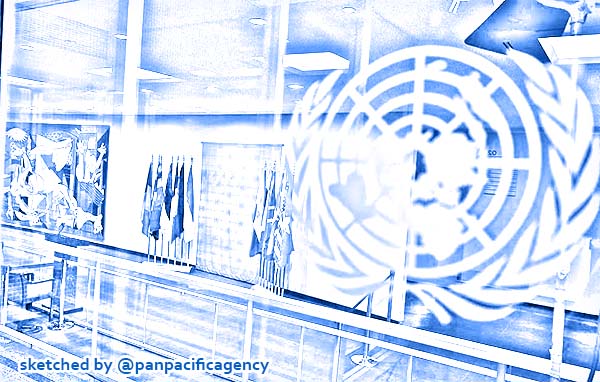UN Security Council calls for immediate ceasefire in Nagorno-Karabakh

© AP Photo/Mary Altaffer. Sketched by the Pan Pacific Agency.
UN, Sep 30, 2020, TASS. The UN Security Council called upon Armenia and Azerbaijan to immediately stop hostilities, said Nigerien envoy to the United Nations, Abdou Abarry, who is the council’s president for the month of September, TASS reported.
“Security Council members voiced support for the call by the Secretary General on the sides to immediately stop fighting, de-escalate tensions and return to meaningful negotiations without delay,” he said.
Abarry said a meeting with the participation of Armenia and Azerbaijan was possible.
“[Security Council members] strongly condemn the use of force and regret the loss of life and the toll on the civilian population,” he added.
The situation in Nagorno-Karabakh escalated on September 27, when Azerbaijan said its positions had come under extensive fire from Armenia. Armenia, in turn, said the Azerbaijani army had staged an offensive in the direction of Nagorno-Karabakh. It said a number of settlements in Nagorno-Karabakh, including its administrative center Stepanakert, had come under shelling by Azerbaijan. Both sides report casualties, including among civilians. Both Armenia and Azerbaijan have imposed martial law and announced mobilization.
The conflict between Armenia and Azerbaijan over the highland region of Nagorno-Karabakh, a disputed territory that had been part of Azerbaijan before the Soviet Union break-up, but primarily populated by ethnic Armenians, broke out in February 1988 after the Nagorno-Karabakh Autonomous Region announced its withdrawal from the Azerbaijan Soviet Socialist Republic. In 1992-1994, tensions boiled over and exploded into large-scale military action for control over the enclave and seven adjacent territories after Azerbaijan lost control of them. Talks on the Nagorno-Karabakh settlement have been ongoing since 1992 under the OSCE Minsk Group, led by its three co-chairs – Russia, France and the United States.